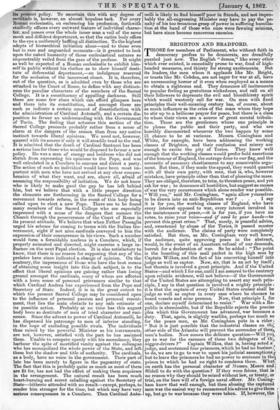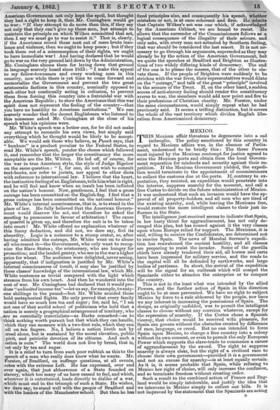BRIGHTON AND BRADFORD.
THOSE few members of Parliament, who without faith in democracy profess to be democrats, are dreadfully puzzled just now. The English " demos," like every other which ever existed, is essentially prone to war, fond of high- handed measures, and thirsty for strong excitements. But its leaders, the men whom it applauds like Mr. Bright, or trusts like Mr. Cobden, are not eager for war at all, have an unreasoning horror of it even when employed as a means to obtain a righteous end. They denounce all incitements to popular feeling as gratuitous wickedness, and call on all their followers to deprecate the evil and bloodthirsty spirit which would wantonly call for war. On men with fixed principles their well-meaning oratory has, of course, about as much influence as the cries of the mass whom they hope to stir up to a bellicose prayer for peace, but there is a class to whom their views are a source of great mental tribula- tion. These are the gentlemen whose one principle is to please the public and their party, and who are horribly disconcerted whenever the two happen by some ill chance to be at variance. Messrs. Coningham and White, for example, have been addressing the working classes of Brighton, and their confusion and misery are enough to excite the pity of Tories. They know well enough that the working classes would prefer bold assertions of the honour of England, the outrage done to our flag, and the necessity of summary chastisement to any conceivable argu- ment. But then, if they made the appeal, they would quarrel with all their own party, with men, that is, who, however mistaken, have principle other than that of pleasing the mass. They are obliged, therefore, to trim, to threaten peace, and yet ask for war ; to denounce all hostilities, but suggest as causes of war the very occurrences which alone render war possible. " Will you," said Mr. Coningham, "again allow yourselves to be drawn into an anti-Republican war ? . . . I say it is for you, the working classes of England, who have every interest opposed to war, every interest involved in the maintenance of peace,—it is for you, if you have no votes, to raise your voice—and if need be your hands—to prevent this great crime." That, surely, is peaceful advice, and, sweetened by abuse of the Tories, it passed muster with the audience. The claims of party were completely satisfied. But then, as Mr. Coningham very well knew, the audience, quite approving peace in the abstract, would, in the event of an American refusal of our demands, hurrah for a declaration of war. So he added : " The point is the boarding of this mail packet in the high seas by Captain Wilkes, and the fact of his converting himself into judge as well as captor. Now, sir, that is an act by itself ; but therein is involved a great principle. And if the United States—and which I for one,until I am assured to the contrary upon reliable evidence, will not believe—if the Government of the United States are attempting to assert any such prin- ciple, I say in that question is involved a mighty principle : it is that the captain of every United States cruiser shall be judge as well as captor in every case where be chooses to board vessels and seize persons. Now, that principle I, for one, declare myself determined to resist." War with a Re- public is abominable, but if the Republic rejects the precise plea which this Government has advanced, war becomes a duty. That, again, is slightly warlike, perhaps too much so for the peace men, so Mr. Coningham puts in a rider ; " But it is just possible that the industrial classes on th;i: other side of the Atlantic will prevent the surrender of the men's bodies. Now comes the delicate question—Via yo .k. go to war for the carcases of these two delegates of the. nigger-drivers ?" Captain Wilkes, that is, having acted a judge, and sentenced four prisoners, which he had no busine: i' to do, we are to go to war to upset his judicial assumptions; g but to leave the prisoners he had no power to sentence in thei prison to which he had no right to condemn them. What on earth has the personal character of Messrs. Mason and} Slidell to do with the question? If they were felons, that is no reason why they should be seized without law, or treaty, or trial, on the bare will of a foreign naval officer. Mr. Coning- ham knew that well enough, but then abusing the captured men was the easiest way to recommend his advice to give them . up, but go to war because they were taken. If, however, the American Government not only kept the spoil, but thought they had a right to keep it, then Mr. Coningham would go to war : " If they attempt to do more than this, if they say not only that they can't give up these men, but attempt to maintain the principle on which Wilkes committed that act, then I say we must go to war to resist it." That is, clearly, if the Americans seized these men out of mere brute inso- lence and violence, then we ought to keep peace ; but if they took them out of a misconception of their rights, we ought to have immediate war I And having declared that he would go to war on the very ground laid down by the Administration, Mr. Coningham abuses them for laying down that ground in language scarcely heard since 1813: " I make this appeal to my fellow-townsmen and every working man in this country, now while there is yet time to come forward and memorialize the Government and prevent the two great aristocratic factions in this country, nominally opposed to each other but continually acting in collusion, to prevent them from forcing this country into a fratricidal war with the American Republic ; to show the Americans that this war spirit does not represent the feeling of the country—that you have no hostility to American institutions." We can scarcely wonder that the decent Englishmen who listened to this nonsense asked Mr. Coningham at the close of his speech what his opinions were. Mr. White's speech was a better one, for he did not make any attempt to reconcile his own views, but simply said everything which he thought would be likely to be accept- able. We would ask those who believe, as Punch says, that " bunkum" is a product peculiar to the Federal States, to read Mr. White's speech, ponder the cheers which followed it, and remember that the larger the constituency the more acceptable are the Mr. Whites. He led off, of course, for the war in true American style, the style of Judge Bigelow on the same question : " I, for one, do not wish to consult text-books, nor refer to jurists, nor appeal to other dicta with reference to international law. I believe that the heart, the instinctive feeling of an Englishman, tells him what is right, and he will feel and know when an insult has been inflicted on the nation's honour. Now, gentlemen, I feel that a gross outrage has been committed on the English flag. I feel that a gross outrage has been committed on the national honour." Mr. White's internal consciousness, that is, is to stand in the place of law. He fully believed that the American Govern- ment would disavow the act, and therefore he asked' the meeting to pronounce in favour of arbitration ! The cause of quarrel is given up, and therefore the suit is to be taken into court ! Mr. White offered no explanation whatever of this funny deduction, and did not, we dare say, feel its absurdity. Logic is a nuisance to a stump orator, so, after having admitted the outrage, Mr. White went on to abuse all who resent it—the Government, who only want to recog- nize the Slave States ; the aristocracy, who are hungry for promotion; and the landed gentry, who see in the war a higher price for Wheat. The audience were delighted, never seeing, apparently, that if indignation is justified by Mr. White's internal consciousness of insult, it may also be justified by these classes' knowledge of the international law, which Mr. White contemns as trivial compared with the light which streams from his own heart. And then he wandered into the cost of war. Mr. Coningham had declared that it would pro- duce "unlimited income tax"—let us say, for example, twenty- one shillings in the pound—but Mr. White avoided those bold metaphorical flights. He only proved that every family would have so much less tea and sugar ; for, said he, " I am not one of that sordid school of politicians who hold that a nation is merely a geographical arrangement of territory, who Are so essentially materialists—as Burke remarked—as to .think nothing worth pursuit but that which they can handle, which they can measure with a two-foot rule, which they can ell on ten fingers. No, I believe a nation liveth not by n.ead alone, but is sustained by the moral elevation, public pirit, and patriotic devotion of its citizens. And such a cation is ours." The world does not live by bread, that is, mt only by tea and sugar. It is a relief to turn from such poor rubbish as this to the Speech of a man who really does know what he wants. Mr. Forster, of Bradford, on suffrage questions, at all events, rotes with the extreme Left. He has expressed, over and over again, that just abhorrence of a State founded on slavery, which too many of us have ceased to feel, and which, wherever it is entertained, leads directly to dislike of a war, which must end in the triumph of such a State. He wishes, we dare say, to stand well with the people of Bradford and with the leaders of the Manchester school, But then he has fixed principles also, and consequently his speech, whether mistaken or not, is at once coherent and firm. He admits that Captain Wilkes's act was one which, if acknowledged by the American Cabinet, we are bound to resist. He allows that the surrender of the Commissioners follows as a logical consequence of the illegality of their seizure, and only asks, with every man not actuated by Southern feeling, that war should-be considered the last resort. It is not ne- cessary to go through his arguments, superseded as they may already be by the action of the American Government, but we quote the speeches at Bradford and Brighton as illustra- tions of two widely differing kinds of democracy. The end of the one is to please the masses, that of the other to ele- vate them. If the people of Brighton were suddenly to be stricken with the war fever, their representatives would dilate on the " outrage," and talk of the great " principle" involved in the seizure of the Trent. If, on the other hand, a sudden access of anti-slavery feeling should render the constituency averse to war, the members would add new point and fire to their professions of Christian charity. Mr. Forster, under the same circumstances, would simply repeat what he had previously said. It seems a trifling distinction, but it covers the whole of the vast territory which divides English libe- ralism from Americanized democracy.



































 Previous page
Previous page